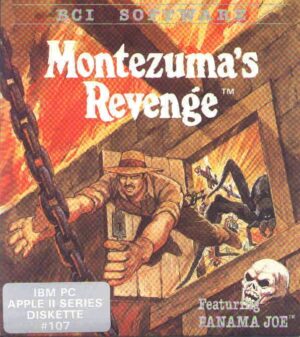Retro Replay Review
Gameplay
Missile Command TB stays true to the frantic, arcade-style defense of the original Atari 2600 classic, but the inclusion of trackball and mouse support elevates precision and responsiveness. Whether you’re using the CX-80 Trak-Ball, an Atari ST or Amiga mouse, or the CX-22 model Trak-Ball, each peripheral delivers a slightly different feel. The CX-80 offers smooth, continuous motion that mirrors the physical rotation of a turret, while the CX-22’s stiffer resistance rewards controlled flicks. The Amiga mouse version, though less tactile, benefits from familiar PC-style click-and-drag, making it accessible for players new to trackball controls.
(HEY YOU!! We hope you enjoy! We try not to run ads. So basically, this is a very expensive hobby running this site. Please consider joining us for updates, forums, and more. Network w/ us to make some cash or friends while retro gaming, and you can win some free retro games for posting. Okay, carry on 👍)
Core mechanics remain unchanged: incoming missiles descent in varied trajectories, and you must intercept them by launching counter-missiles from your three ground turrets. Shots are finite, and every click or spin carries weight. Waste too many rounds on missed targets and you risk watching your cities crumble one by one. This built-in tension turns each play session into a high-stakes resource management puzzle, where you must balance aggressive interception with cautious conservation.
Difficulty ramps up steadily, introducing faster missiles and unpredictable arcs that force you to adapt rapidly. The trackball’s sensitivity options let you fine-tune cursor speed to match your reaction time, making later waves feel less like a chore and more like an exhilarating test of skill. The joy of perfectly timing a shot to annihilate a cluster of warheads is a satisfying payoff, ensuring addictive replayability as you chase ever-higher scores.
Graphics
Visually, Missile Command TB embraces the Atari 2600’s chunky, minimalist aesthetic. Cities are rendered as simple blocks, while missiles appear as bright lines streaking downwards against a stark black backdrop. This stripped-down presentation may feel retro, but it serves the gameplay perfectly, keeping the action clear and collisions unambiguous even when multiple explosions erupt on-screen.
Explosions are represented by expanding circles of pixels that bloom outward on impact, offering a pleasing visual reward when your timing is spot-on. Though primitive by modern standards, these bursts convey a satisfying punch and help you gauge the blast radius at a glance. The lack of background detail means nothing distracts from incoming threats, ensuring your focus remains locked on defense.
Subtle differences in peripheral versions can affect visual smoothness. The CX-80 variant often feels more fluid, as the trackball’s continuous input translates directly to cursor movement, minimizing onscreen stutter. Meanwhile, the CX-22 and Amiga mouse versions exhibit slight step-changes in pointer position, but remain perfectly serviceable for most players. Overall, graphical fidelity may be modest, but it’s exactly what fans of classic arcade shooters want.
Story
Missile Command TB’s narrative is built on a simple, high-stakes premise: your cities lie under siege by a barrage of nuclear missiles. There are no complex characters or branching dialogues—just you against an endless onslaught. This minimalist story design harks back to the arcade era, where immediacy and replayability took precedence over elaborate plots.
Each level escalation implies a growing geopolitical threat, yet the real story unfolds through your play. As cities vanish one by one, you feel the gravity of each defensive lapse and the triumph of each successful interception. In this way, the personal drama of survival becomes your story, driven by tense decision-making and split-second reactions rather than scripted cutscenes.
Though there’s no narrative exposition beyond the opening premise, the emotional arc is clear: maintain as many cities as possible and prove your mastery of the defenses. The lack of storytelling frills ensures that every moment you spend under fire feels urgent, unfiltered, and entirely yours to conquer or lose.
Overall Experience
Missile Command TB delivers a pure, unadulterated arcade defense experience that remains as thrilling today as it was on its original release. The various trackball and mouse options allow you to tailor controls to your liking, adding a fresh tactile dimension to a venerable classic. Whether you’re a retro enthusiast or a newcomer seeking a distilled test of reaction and strategy, this version holds up remarkably well.
The learning curve is gentle but firm: early levels ease you in, while later waves demand impeccable timing and resource management. The minimalistic graphics and sound design keep the focus squarely on gameplay, ensuring that every missile intercepted feels like a hard-won victory. There’s a timeless appeal in watching those pixelated explosions bloom as you stave off destruction.
Ultimately, Missile Command TB shines as a testament to the enduring power of simple, well-executed game design. It’s easy to pick up, hard to master, and endlessly replayable—qualities that make it a worthy addition to any retro gaming collection or modern emulation setup. If you crave a straightforward, pulse-pounding challenge with authentic trackball or mouse controls, this is one strategic shooter you won’t want to miss.
 Retro Replay Retro Replay gaming reviews, news, emulation, geek stuff and more!
Retro Replay Retro Replay gaming reviews, news, emulation, geek stuff and more!




Reviews
There are no reviews yet.